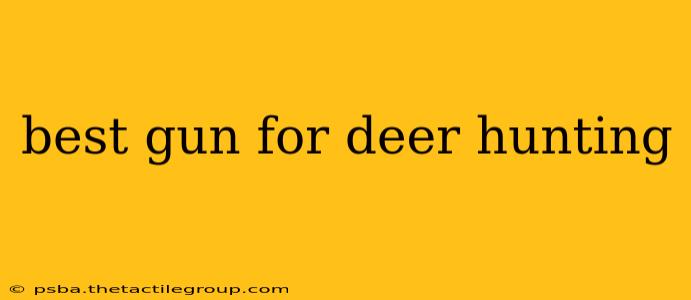Choosing the right firearm for deer hunting is a crucial decision, impacting your success and safety. This isn't a simple "one-size-fits-all" answer; the best gun depends heavily on your hunting style, physical capabilities, hunting location, and personal preference. This guide will explore various options, helping you make an informed choice.
Factors to Consider When Choosing a Deer Hunting Gun
Before diving into specific firearms, let's examine the key factors influencing your selection:
1. Caliber and Cartridge:
The caliber (diameter of the bullet) significantly affects energy transfer and range. Popular deer hunting calibers include:
-
.30-06 Springfield: A classic, powerful round offering excellent accuracy and stopping power at longer ranges. Its widespread availability and affordability make it a popular choice.
-
.308 Winchester (7.62x51mm): A slightly smaller, more manageable cartridge than the .30-06, offering good accuracy and less recoil. It's a versatile choice suitable for various hunting situations.
-
.270 Winchester: Known for its flat trajectory and accuracy, making it ideal for longer shots. It offers a good balance between power and recoil.
-
6.5 Creedmoor: A rapidly growing favorite, known for its exceptional accuracy, low recoil, and excellent long-range ballistics. It’s a fantastic option for precision shooting.
-
7mm Remington Magnum: For hunters who need maximum power and range, this magnum cartridge delivers impressive stopping power. However, it comes with significant recoil.
-
.243 Winchester: A lighter-recoiling cartridge, suitable for newer hunters or those who prefer a less powerful round. It’s effective at moderate ranges.
Choosing the right caliber requires consideration of the average shot distance in your hunting area. Longer shots demand flatter-shooting cartridges, while closer shots offer more flexibility.
2. Rifle Type:
Several rifle types are suitable for deer hunting:
-
Bolt-Action Rifles: Known for their reliability, accuracy, and relatively low cost. They require manual operation to load and unload rounds, but offer excellent precision.
-
Lever-Action Rifles: Faster to operate than bolt-action rifles, allowing for quicker follow-up shots. They're often favored for their traditional design and ease of use.
-
Semi-Automatic Rifles: These rifles offer rapid firing capabilities, useful for potentially quick follow-up shots on moving game, but they are usually more expensive.
-
Muzzleloaders: Traditional black powder rifles that offer a unique hunting experience. They require more maintenance and preparation, but can be highly effective.
The choice depends on your shooting style and comfort. Beginners might find bolt-action rifles easier to handle, while experienced hunters may prefer the speed of a lever-action or semi-automatic.
3. Shot Placement:
Regardless of the firearm you choose, accurate shot placement is paramount. A well-placed shot in the vital areas (heart and lungs) ensures a quick, humane kill. Practice extensively before hunting season to improve your accuracy.
4. Personal Preferences:
Ultimately, the "best" gun is the one you're most comfortable and confident using. Consider factors like recoil tolerance, weight, and overall ergonomics when making your decision.
Specific Gun Recommendations (Examples):
While this isn't an exhaustive list, here are a few examples of popular and well-regarded deer hunting rifles:
-
Ruger American: A budget-friendly bolt-action rifle offering excellent value and accuracy.
-
Remington 700: A classic bolt-action rifle renowned for its reliability and precision.
-
Winchester Model 70: Another legendary bolt-action rifle known for its accuracy and durability.
-
Savage Axis XP: A cost-effective bolt-action rifle with a good reputation for accuracy.
Remember: This information is for guidance only. Always consult with experienced hunters and firearm professionals before purchasing a firearm. Proper firearm safety training is essential before handling any firearm.

